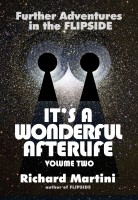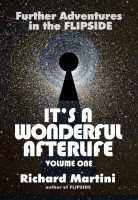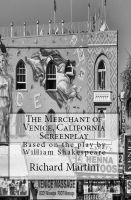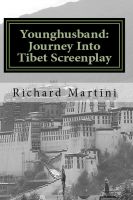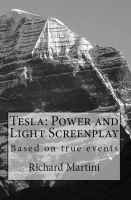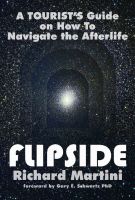Interview with Richard Martini
How did you come upon this research into the Afterlife?
A close friend died and came to visit me a couple of times. And then she took me, literally, in an OBE to visit her in her galaxy where she resides, as if to say "you wanted to know where I was, here I am." Instead of ignoring these events, I began to study them in detail; NDE's, Past life regression, until I found the work of Michael Newton (Journey of Souls). I interviewed him, his wife, and began filming "life between life" sessions for a documentary "Flipside." But once I began seeing how now matter who the subject was, or who the hypnotherapist was, everyone said the same things about the afterlife - including me during two sessions - I realized the research was too broad for just a documentary and wrote this book.
What was your own past life regression and between life sessions like?
When they asked if I wanted to try one, I realized i'd be crossing the line as a journalist, my training, and as a documentary filmmaker. But in a George Plimpton moment, I said yes, and had pretty much the identical journey everyone else had. But not the same - quite different - but the sign posts were identical; spirit guide, soul group, council of elders - and I found my friend in her classroom, wondering what I was doing there visiting her. Two years later, I did another session with a second therapist to see if the results would be similar - and I felt like I had "left the door open" for two years, waiting for my return. All I can say is that it's a profound version of therapy - you can have an NDE without experiencing the ND part.
Has this research alter your beliefs or religious background?
Honestly I think it enhances them. Not in the traditional way - because there's no reports of hell, or a place of suffering - only forgiveness, compassion and a strong desire to help other people. I realized after filming these sessions that these people were reporting eyewitness accounts of what happens between lives - the process, the journey, how it works - the meaning of life really. And that transforms anyone's concept of what religion might be - however, the more I examined these reports, the more I saw how religion is like the echo of what's really happening - and the religions that focus on love, on compassion, on loving everyone as themselves - were actually mirroring what people say about the afterlife. No offense to any religion - but I think it enhances it.
How has your background contributed to you being an author?
During my first LBL I got to ask the question; "Why did I choose me?" And I saw that every action, word or creation contains the energy of healing - the energy of the person creating it, and these works of art, or acts of love, go out into the universe like ripples on a lake. They can and do affect people that experience a song, an artwork - anything we create that comes from the heart. And it was then I saw how I had chosen to be a filmmaker, as I thought the combination of words, music, expressions of love through actors, could actually heal people. I also noted "I'm sorry that I'm just not better at it" - meaning my career didn't turn out as I had planned or hoped. But I also got the message that I should be patient - one can only hope!
What's your opinion on self publishing - smashwords, etc?
I tried the traditional route - one publisher wrote "we aren't publishing memoirs right now." I was startled - was my book a memoir? so i went back and cut out as much as I could about me and made it just about what I'd been hearing and seeing.. I did leave in how I came to these conclusions, and my own life experience - and when I was done, had some great friends help me edit it. But it went to #1 at Amazon because i filmed a book talk - I posted that talk to ten people on youtube, some other people saw it and invited me to speak at their group in Virginia Beach, and someone in that audience wrote to "Coast to Coast" and insisted I should go on - the day after my first appearance with George Noory, the book was #1 in its genres.
What's the difference between past life regression and between life therapy?
As Michael Newton puts it, the PLR is a "gateway" into the spirit world. Over 30 years he had 7000 clients take him to the between lives realm - something he was at first skeptical of, and didn't believe in past life regression. But once a client took him there, he began to catalog what everyone could observe, and my book was my own way of confirming his work using a dozen subjects that I had chosen. But in an LBL session, the client goes through their life, then to a "previous life that has some significance to this one" and finally, they go to the death scene of that previous lifetime - and that's the entryway into the spirit world. And once you're in there - the whole universe opens up with all of its secrets. So PLR is like a warmup, and LBL is the game.
Is your research espousing a new age philosophy of some kind?
People frequently correct me and say "thats what you believe" and I say, actually, I'm just reporting what thousands have said under deep hypnosis. It has nothing to do with a belief - or philosophy - it's just reporting the details of these sessions, and how remarkably similar they are, as well as similar to NDEs. So I'm more of a journalist reporting these details - and the film "Flipside" is just the same, but allowing the audience to hear the people in their own voices say what they're seeing and experiencing them. So if you don't believe what you're reading in the book, watch the documentary and judge for yourself whether these people are being manipulated or making the details up as they go along. It's just not what I've experienced.
Perhaps what people are experiencing in these sessions is the Jungian unconscious?
I've heard this from at least one scientist. I cite in the book a case where an Oxford professor had an LBL and saw a woman from this lifetime as his soul mate in a previous lifetime. After he wrote to me about the session I asked if he was friends with the woman still; he was. I asked if he could not tell her anything about his session, and I would arrange a session for her in another city with another therapist. As it turned out it was in NYC - and she had the identical past life memory of being married to this fellow in the 19th century in Boston. Two individuals doing LBL sessions with different therapists - neither therapist knew about the other, and she knew nothing of his session. The odds are astronomical, but it points to a reality - life continues on.
Where can people find your films and work?
I started to film all of my book talks, as well as my talks with near death organizations (IANDS). You can find them by searching my last name, Martini, the name of the book "Flipside" and youtube. I speak for a couple of hours each time on these topics, some of the stories are the same, and some are anecdotes, but by and large you can get a sense for free of what it is I'm talking about. One is a live demonstration of the technique with a woman who came out of the audience and was having some difficulty - Scott De Tamble of lightbetweenlives.com did a session on the spot and helped this woman. It's pretty startling, and the only LBL session I'm aware of that's ever been done in this way.
What's the future of this research?
I've continued to film LBL sessions - and am working on my next book on the topic: "Flipside: the Veil is Thinning." There are more stories and some incredible sessions. I'm also participating with Gary Schwartz PhD who wrote the foreword to Flipside, in scientific research in the field. I've solicited his help in creating a study where we can add all the protocols needed to have the results published in a peer reviewed journal (He has PhD's from Harvard and Yale and teaches at the University of AZ). I'm not really interested in proving there's life after death - for some it's just too much to fathom - but I am interested in getting folks to realize we MIGHT be coming back to the planet, so doesn't it make sense to leave clean water, air and food behind?
Where can we find your work?
As a filmmaker, I'm on netflix, imdb, with some pretty hard to find titles. I have links to most of them on my web page, richmartini.com - as an author you can find me online about everywhere, createspace and ingram are offering the book for print, but smashwords and itunes and the rest will have it online. Although I'm not quite sure why "Flipside" is only offered on itunes in Japan. Maybe that can be cleared up. Anyways, the good news is we choose our lives, we choose our parents, we even choose the stones in our path so we can learn from crossing them. The question is; why did you choose to be here? What did you come to teach or learn? And how can you expand your concept of compassion or love to include everyone on the planet?
Do you remember the first story you ever wrote?
My first published work was a joke that I sent into the local paper: "Cat wins a race, gets the ribbon for first place. Goes into a bar, and spend the afternoon celebrating with his pals. Goes home, wife is upset, "Where have you been?" Tells her the story about winning the race and going to the bar. Wife doesn't believe him. His kitten goes down to the bar, sits up on the stool and bartender says "What'll you have?" Kitten says "Pap's blue ribbon." I made $5 and I was 10 years old.
What is your writing process?
I approach writing like I do a film, or a story - I tend to map it out, hone it, then as I go along see what happens. In the case of writing these latest non fiction books, I let the interviews and subjects speak for themselves, and try to find a way to create a narrative. One thing leading to the next. There's two kinds of sculptors in the world; Donatello and Michaelangelo (who was Michelangelo's teacher). Donatello took a piece of marble and shaped it, honed it, kept polishing and fixing it until he was happy with the end result. Michelangelo would carve what he was interested in - and arm, a face, a leg - almost perfectly, as if the figure was already in the marble and he was releasing it. That's two ways to approach writing - either shape it, hone it, rewrite it - or spend time on perfecting one chapter, then another, then fit them together as if they're emerging from the book itself.
Do you remember the first story you ever read, and the impact it had on you?
One of the first that had a dramatic impact on me was "Tale of Two Cities" "It was the best of times, it was the worst of times..." and "Tis a far far better thing that I do than I have ever done, tis a far far better place that I go than I have ever been." Doesn't get much better than that. I was part of a grade school "great books" program, and was reading a Hardy Boy's book per day. So the combo of Hardy boys and great writers influenced me when I started reading. Probably how I work in films; pulpy with a stab at profundity. Not very successful at it I might add.
How do you approach cover design?
Let a professional do it. I suggest some ideas, and then let him or her come up with their vision.
What are your five favorite books, and why?
Depends on what point in my life we're talking about. I've been reading a lot of books about the afterlife as of late, so I'm a fan of David Bennett's "Voyage of Purpose" Annie Kagan's "Afterlife of Billy Fingers" Galen Stoller's "My Life Afterlife Life" - I list them all in the bibliography of my books.
What do you read for pleasure?
Non fiction bios.
What's the story behind your latest book?
After "Flipside" came out people started contacting me with the transcripts of their between life sessions. Also, I spoke to some scientists at the University of Virginia, and they basically observed that science doesn't consider hypnosis a valid scientific tool. So I examined near death cases (which have been studied scientifically) and compared them to between life accounts and found how remarkably similar they are. Also I include some other interviews that corroborate the research in general, like the attorney who says that all of her clients have been visited by their victims - she represents second degree killers - car accidents, etc - and says that all of her clients have had a vision, dream or visitation from their victims, saying in essence "I'm okay. And I can help you." That's unlike anything that's ever been reported before, and if its accurate - gives us a different perspective on what we're doing on the planet.
What motivated you to become an indie author?
My agent sent my book around to the majors and they said "Amazing story, but who is he? How do we sell and market him?" Being in the film business, I understand that - you still need to get people booked onto talk shows to sell a book. And then one of the major publishers looked at the unedited manuscript and said "We aren't doing memoirs." Which I thought was funny. Really? I show how life doesn't end, and that's the take away? So I cut out a number of chapters from Flipside that were about me - and my journey to this material, which found their way into the sequels "It's a Wonderful Afterlife" (book one and two). I don't agree that hearing what my journey was to the material makes it a memoir - even though I've led an unusual life. It allows for context in that, "this fellow is writing about stuff that happens to everyone, and he was in this unique position to film it." So take it or leave it, the books are not about me - but show how any reasonable person on the same trip would come up with the same conclusions.
What do your fans mean to you?
My first Amazon review was something like "This book isn't as good as Michael Newton's work in this field." And I thought "Well, that's the end of that. Big waste of a year of my life." But then I filmed myself giving a book talk, and that led to me being invited to Virginia Beach to speak about the book. And someone in the audience said "You should be on "Coast to Coast" radio to talk about this. And that fellow wrote a letter to the producers of the show and talked them into having me on. At first it was going to be an hour, but after chatting with them, they moved it to three. And I've been on four times now, and four times my books have gone to #1 in their genres. So if I am to learn anything from this - it would be "Just write. The audience that you're writing for can't find you unless you actually get the book into the world, so they can find you." I've had a few people thank me for "saving their life" with this research, which I took to mean they were suffering so immeasurably from a personal tragedy they couldn't move forward. And I always reply "It's not me saving your life, it's you - seeking out this research and allowing it into your consciousness." And I'm not espousing some belief or philosophy - I'm just reporting what people say consistently about the afterlife.
What are you working on next?
Maybe a sequel film to "Flipside." I have lots of hours of footage from my interviews and filmed sessions. I just haven't figured out how to tell it in a cohesive way. It took me a long time to figure out how to turn the research from "Flipside" into a documentary - about 3 years - but eventually realized it didn't have to be slick or polished. It just had to get out there so folks who wanted to see what I was writing about could see it. And the same goes for the Audio books - I've taken some significant flak for reading the books myself - sometimes I start and restart sentences, sometimes my cat meows, sometimes I lip smack... but I'm reading what I wrote. I'm passing along the information as only I can do it. And for those who prefer polished audio books, sorry, that's not happening here. It reminds me of when I recorded a CD for the Nechung Monks in India - we did it live in their monastery. You can hear birds chirp, floor boards creak, and tea being poured. Along with coughing, clearing throats. But you can also hear the intention behind the prayers. So I left in all my squeaks and imperfections - to retain the intention behind the words.
Published 2015-04-08.
It's a Wonderful Afterlife: Further Adventures into the Flipside Volume Two
"It's A Wonderful Afterlife: Further Adventures into the Flipside" Volumes one and two take a quantum leap forward into the afterlife, includes interviews with scientists discussing the source of consciousness, comparing near death experiences (NDE) with between life sessions (LBL), and includes interviews with people who claim to be speaking from the afterlife.
It's a Wonderful Afterlife: Further Adventures into the Flipside Volume One
Author and filmmaker of "Flipside" goes beyond his research into hypnotherapy and what people say about the afterlife to include scientists (Dr. Bruce Greyson, Gary Schwartz PhD, Mario Beauregard PhD) discussing post materialist research into consciousness. New transcripts of LBL hypnotherapy sessions, accounts of near death experiencers and others who say the same things about the afterlife.
Merchant of Venice, CA Screenplay
A screenplay based on the play "The Merchant of Venice" by William Shakespeare. Some years ago, the late great actor Ron Silver had agreed to play this character; a film producer named Shylock. I pitched the film to Tom Bernard at Sony Classic pictures and pointed out the "No one has made a screen adaptation of Shakespeare's play!" so much for giving great ideas.
Younghusband: Journey Into Tibet Screenplay
A screenplay for a feature film. In 1904 Francis Younghusband led a band of 10,000 into Tibet with unexpected consequences. Thousands of unarmed Tibetans were sent to defend their country, a mistaken volley resulted in thousands of deaths. The Tibetans fought valiantly, and nearly defeated the British regiment, resulting in the highest elevation of a battlefield in world history.
Tesla: Power and Light Screenplay
A screenplay about the epic story of titans who shaped the 21st century; Nikola Tesla, Thomas Edison, Mark Twain, J.P. Morgan, Anne Morgan. Tesla's battles with Edison, with Morgan are legendary, his battles with OCD and credit for his inventions are as well. One of the least famous and most important figures in US History, the story has never been told about his accomplishments.
Flipside: A Tourist's Guide on How To Navigate the Afterlife
What happens after we die? "Flipside" explores startling new evidence for life after death, via the "life between lives," where we reportedly return to find our loved ones, soul mates and spiritual teachers. Based on the evidence of thousands who claim that under deep hypnosis they saw and experienced the same basic things about the Afterlife; features interviews with Michael Newton and others.
